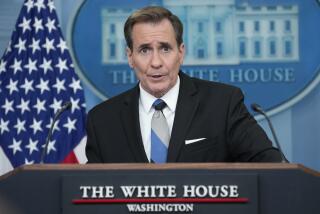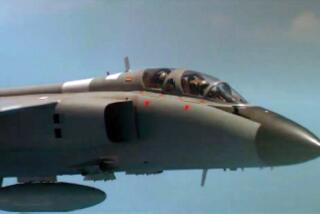China general won’t visit U.S.
BEIJING — China has canceled a senior military visit to Washington and shelved other military and diplomatic contacts to protest an announced $6.5-billion U.S. arms sale to Taiwan, Pentagon and State Department officials said Monday.
“The Chinese reaction is unfortunate and results in missed opportunities,” said Marine Corps Maj. Stewart Upton, a Defense Department spokesman, in a statement. “The bilateral events affected involve senior level visits and humanitarian assistance-disaster relief exchanges that were scheduled to occur between now and the end of November.”
In addition to the cancellation of a senior general’s visit to the U.S., China will reportedly halt port calls by U.S. naval vessels, postpone “indefinitely” meetings on stopping the spread of weapons of mass destruction and pull out of a Sino-U.S. humanitarian assistance and disaster relief dialogue set for late November.
Beijing will continue, however, to engage with the U.S. on international efforts to halt Iran’s and North Korea’s nuclear programs, the Associated Press reported.
China issued no immediate statement, preferring to outline its intended response through diplomatic channels. But the moves were not unexpected given China’s long-standing opposition to such weapons sales. China considers Taiwan part of its territory and has vowed to use force if necessary to ensure that the island remains part of the country.
“The U.S. shouldn’t sell arms to Taiwan,” said Li Jiaquan, a retired Taiwan analyst with the Chinese Academy of Social Sciences. “The problems between China and Taiwan are totally internal. America is interfering in our internal affairs.”
Analysts said this wasn’t a bad time for Beijing to register its pique. After severing military-to-military contact for a couple of months, it will be able to repair relations in time for a new U.S. administration in January.
“They have to make their displeasure known,” said Shelley Rigger, professor at Davidson College in North Carolina. “It’s pretty low risk at this point to have a dust-up.”
The $6.5-billion package, down from a $12-billion proposal, is a carefully crafted compromise, analysts said. “On the one hand, it reassures Taiwan that Washington still cares,” said Andrew Yang, secretary-general of Taiwan’s Chinese Council of Advanced Policy Studies, a think tank. “On the other hand, it tries to scale down tension between the U.S. and China.”
The weapons involved, including 330 Patriot missiles, 30 Apache helicopters, 182 Javelin antitank missiles and spare parts for F-16 fighter jets, are solely defensive, Yang added.
The Patriot missiles are meant to counter a Chinese attack, but there aren’t enough of them to fend off the 1,000-plus Chinese missiles aimed at Taiwan. The range of the Apache helicopters limits any threat to Chinese coastal regions. The Javelin missiles are aimed at deterring a Chinese landing, and the spare parts are needed for routine maintenance.
The package dovetails with Taiwanese President Ma Ying- jeou’s policy of bolstering the island’s defenses even as he tries to improve economic and political relations with Beijing.
The deal appears more likely to go through than at any other time in its near-decade of tortuous debate and review. Taiwan’s legislature has authorized funding for the purchase. The sale automatically becomes effective within 30 days of the Bush administration’s submitting it to Congress, assuming no major opposition.
“At the end of the day, people in Washington probably said we can’t leave this to the next administration, we can’t have them start out by dropping this bomb in Beijing’s lap,” Rigger said.
“In my opinion, this was an act of responsible statesmanship before the next guy takes over.”
--
More to Read
Sign up for Essential California
The most important California stories and recommendations in your inbox every morning.
You may occasionally receive promotional content from the Los Angeles Times.










